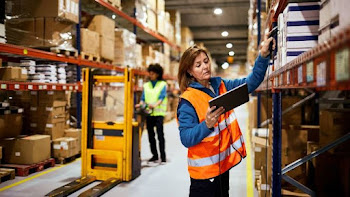RFID Definitions in 2025:10 Applications Changing Daily Life
1. What Are RFID Definitions in 2025?

RFID Definitions in 2025 have evolved to represent more than just the basics of radio frequency identification. Today, RFID Definitions cover a wide range of applications that use electromagnetic fields to identify and track tags attached to objects. These tags store data that can be read wirelessly, allowing for efficient tracking, monitoring, and automation across various industries. From retail to healthcare, RFID is shaping a smarter, faster, and more connected world.
2. How RFID Technology Works in Everyday Situations
To understand RFID Definitions, we must first look at how the technology works. An RFID system includes three main components: a tag, a reader, and an antenna. The tag stores information, and when it's near a reader, the reader uses radio waves to scan the tag and retrieve the data. This process happens instantly and doesn’t require direct contact. This wireless data exchange is what makes RFID so powerful in everyday scenarios.
3. RFID in Retail: Smarter Shopping and Inventory Control
One of the most practical uses of RFID Definitions is in retail. Stores use RFID to manage inventory accurately, reduce theft, and speed up checkout processes. Each product has an RFID tag that allows retailers to track it from the warehouse to the shelf. Shoppers benefit too—automated checkouts and real-time product availability have become common thanks to RFID. In 2025, retailers also use RFID to personalize promotions based on customer shopping behavior.
4. RFID in Healthcare: Ensuring Patient Safety and Medication Tracking
In healthcare, RFID Definitions include life-saving applications. Hospitals use RFID to track medical equipment, monitor patient movement, and ensure that medications are correctly administered. For example, a nurse can scan a patient's RFID wristband to confirm their identity and medication details, minimizing human error. RFID also helps in managing blood samples, surgical tools, and even staff access within secure zones of the hospital.
5. Public Transport and RFID: Seamless Commuting Made Easy
Another area where RFID Definitions are transforming daily life is public transportation. In many cities, RFID-enabled smart cards are used for boarding buses, subways, and trains. These cards store travel data and automatically deduct fares. Commuters enjoy faster boarding and reduced wait times, while transport authorities benefit from better crowd management and real-time usage data. In 2025, RFID cards are even integrated with mobile wallets and apps.
6. RFID in Smart Homes and Personal Gadgets
RFID technology has also found its way into our homes. Under RFID Definitions, smart locks, appliances, and gadgets can now recognize residents and respond to commands automatically. Imagine walking into your home and your lights, thermostat, and security system adjust themselves based on your RFID tag or wearable. Personal gadgets like fitness trackers and smartwatches also use RFID to sync with other devices and access secure systems.
7. RFID for Education and Campus Security in 2025
Schools and universities are using RFID to improve both security and operations. RFID Definitions in education include automated attendance systems, access control for secure areas like labs, and even library book management. Students carry RFID cards that log their entry and exit from classrooms, reducing manual tracking. In 2025, RFID also helps parents stay updated on their child’s presence in school through connected apps.
8. RFID in Events and Entertainment: Faster Access and Personalization
RFID wristbands are now common at concerts, festivals, and private events. These wristbands store attendee information and enable fast check-ins, cashless payments, and personalized experiences. As part of RFID Definitions, this technology also helps organizers track crowd movement and control access to VIP areas. Event planners benefit from real-time analytics while guests enjoy a seamless, secure experience.
9. Food Safety and RFID: Tracking from Farm to Plate
Food safety is a growing concern, and RFID plays a crucial role in ensuring transparency. RFID Definitions in the food industry include tracking products through the entire supply chain. From farm harvests to supermarket shelves, each step is logged using RFID tags. This allows for better temperature monitoring, freshness checks, and recall management. In 2025, customers can scan products and trace their journey back to the source.
10. The Future of RFID: Smarter Cities and Connected Living
Looking ahead, RFID Definitions are expanding to support smart city development. Cities use RFID for waste management, public safety, traffic flow, and infrastructure monitoring. For example, RFID tags on garbage bins notify collection teams when they’re full. In parking systems, RFID allows for automatic toll payments and vehicle identification. As cities become more connected, RFID serves as a key technology linking people, places, and processes.
Conclusion: Why RFID Definitions Matter More Than Ever
In 2025, RFID Definitions have grown from basic identification to enabling advanced digital transformation. Whether it's a student tapping into class, a chef tracking fresh produce, or a commuter breezing through a metro gate, RFID is part of daily life. It enhances convenience, improves safety, and supports smarter decision-making across sectors.
Understanding RFID Definitions today means understanding a world that values speed, accuracy, and connectivity. From the moment you wake up to the time you go to bed, RFID is working silently behind the scenes—making life smoother, safer, and smarter.
Call to Action:
Ready to integrate RFID technology into your business or service? Contact AIDC Technologies India for expert solutions built to streamline your operations and improve visibility in 2025.


Comments
Post a Comment